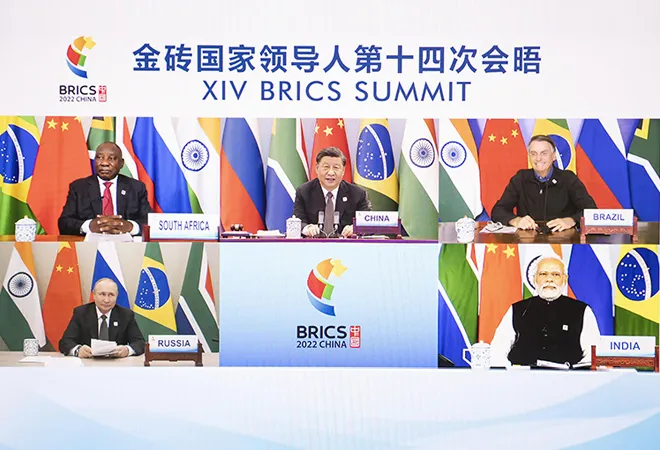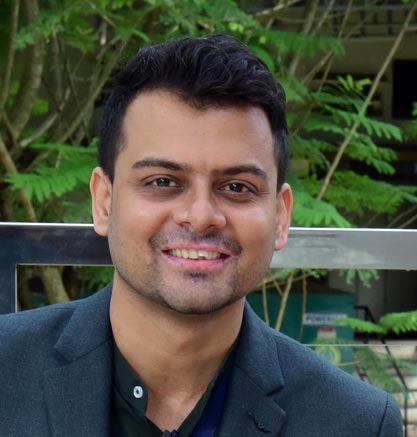-
CENTRES
Progammes & Centres
Location
India placed on the agenda the need for strengthening civil society organisations and think-tanks

In particular, India’s participation saw it emphasising the need for strengthening the BRICS Identity system, creating an online database for BRICS documents, establishing a BRICS Railways Research Network, and strengthening cooperation between micro, small and medium enterprises. These steps are in the direction of improving seamlessness in connectivity and bringing about predictability in supply chains between member states. Furthermore, India’s announcement to hold a BRICS start-up event this year is in sync with its position as the third largest start-up ecosystem in the world and could position India to lead a global South innovation drive. Besides, India placed on the agenda the need for strengthening civil society organisations and think-tanks. India also highlighted the significance of building people-to-people connect within BRICS, especially when the group members represent four vast continents and channels of connectivity remain hampered by lingering post-pandemic disruptions. One of the ways in which the BRICS cooperation can go a long way in assisting the post-Covid global recovery is through the mutual recognition of pharma products — a functioning mechanism among the group’s members. Other important areas of cooperation that were discussed included post-Covid global recovery, advancing BRICS outreach and sustaining space collaboration. The recently formed joint commission on space cooperation for the BRICS nations served as a good precursor to the 14th summit for advancing remote sensing and data sharing mechanisms between member states. While discussions on a possible expansion of BRICS will continue, the promotion of BRICS Outreach and BRICS Plus Cooperation was in the spirit of extending cooperation to other emerging markets and developing countries.India’s announcement to hold a BRICS start-up event this year is in sync with its position as the third largest start-up ecosystem in the world and could position India to lead a global South innovation drive.
Despite these seeming convergences, friction points and challenges between BRICS members continue to fester, and this year’s summit was no exception. India rightly underscored the need for greater sensitivity among BRICS members to each other’s security concerns, particularly when it comes to issues like terrorism. The case in point was China’s recent blocking of a joint move by India and the US to list Pakistan-based Lashkar-e-Taiba leader Abdul Rehman Makki as a global terrorist.The recently formed joint commission on space cooperation for the BRICS nations served as a good precursor to the 14th summit for advancing remote sensing and data sharing mechanisms between member states.
The setting provided by the G7 group’s meeting in Germany and its stipulated agenda of doubling down on sanctions on Russian energy and gold exports to the world will come with its own set of implications for some BRICS members, including India and China, which continue to import energy from Russia. Then there is the issue of China-India ties that show no signs of normalising. Beijing’s reluctance to appreciate the palpable shift in public mood in India after the Galwan crisis of 2020 has resulted in a stasis whereby the two major Asian powers are hardly interacting with each other. BRICS provides one such platform but its ability to influence the trajectory of this bilateral relationship remains rather limited. And in the absence of China-India normalisation, the future of BRICS too will remain in a state of suspended animation, declarations of intent notwithstanding. This year’s summit also made a valiant effort to project a sense of unity but the statements of individual leaders made it clear that the five nations have increasingly differing priorities. The ability of the BRICS platform to cater to these individual preferences is becoming weaker by the day.BRICS provides one such platform but its ability to influence the trajectory of this bilateral relationship remains rather limited.
The views expressed above belong to the author(s). ORF research and analyses now available on Telegram! Click here to access our curated content — blogs, longforms and interviews.

Professor Harsh V. Pant is Vice President – Studies and Foreign Policy at Observer Research Foundation, New Delhi. He is a Professor of International Relations ...
Read More +
Vivek Mishra is Deputy Director – Strategic Studies Programme at the Observer Research Foundation. His work focuses on US foreign policy, domestic politics in the US, ...
Read More +